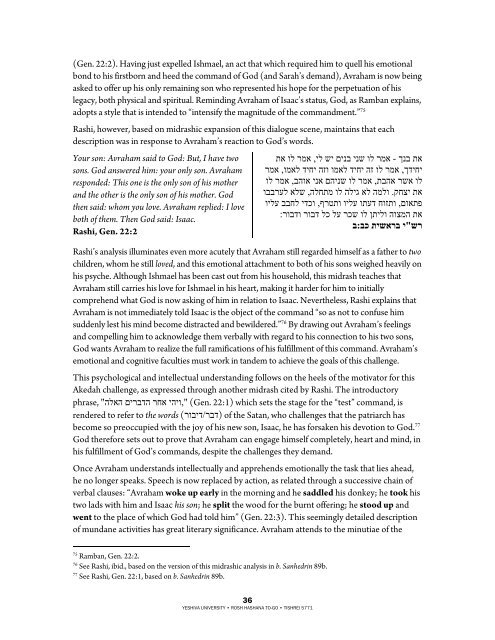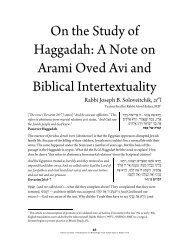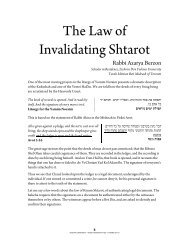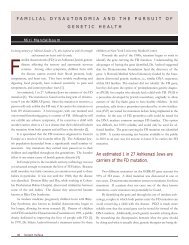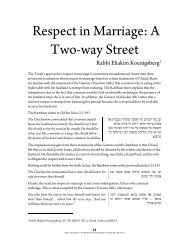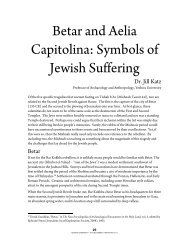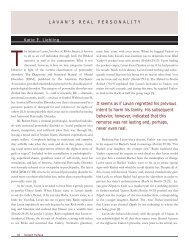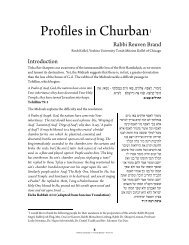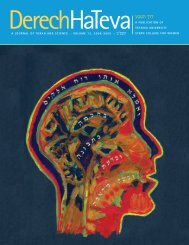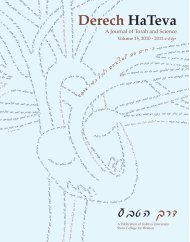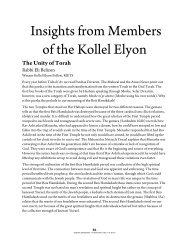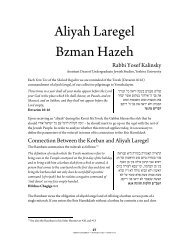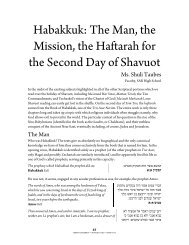YESHIVA UNIVERSITY • ROSH HASHANA TO-GO ... - YUTorah.org
YESHIVA UNIVERSITY • ROSH HASHANA TO-GO ... - YUTorah.org
YESHIVA UNIVERSITY • ROSH HASHANA TO-GO ... - YUTorah.org
Create successful ePaper yourself
Turn your PDF publications into a flip-book with our unique Google optimized e-Paper software.
(Gen. 22:2). Having just expelled Ishmael, an act that which required him to quell his emotional<br />
bond to his firstborn and heed the command of God (and Sarah’s demand), Avraham is now being<br />
asked to offer up his only remaining son who represented his hope for the perpetuation of his<br />
legacy, both physical and spiritual. Reminding Avraham of Isaac’s status, God, as Ramban explains,<br />
adopts a style that is intended to “intensify the magnitude of the commandment.” 75<br />
Rashi, however, based on midrashic expansion of this dialogue scene, maintains that each<br />
description was in response to Avraham’s reaction to God’s words.<br />
Your son: Avraham said to God: But, I have two<br />
sons. God answered him: your only son. Avraham<br />
responded: This one is the only son of his mother<br />
and the other is the only son of his mother. God<br />
then said: whom you love. Avraham replied: I love<br />
both of them. Then God said: Isaac.<br />
Rashi, Gen. 22:2<br />
36<br />
<strong>YESHIVA</strong> <strong>UNIVERSITY</strong> <strong>•</strong> <strong>ROSH</strong> <strong>HASHANA</strong> <strong>TO</strong>-<strong>GO</strong> <strong>•</strong> TISHREI 5771<br />
תא ול רמא , יל שי םינב ינש ול רמא - ךנב תא<br />
רמא , ומאל דיחי הזו ומאל דיחי הז ול רמא , ךדיחי<br />
ול רמא , בהוא ינא םהינש ול רמא , תבהא רשא ול<br />
ובברעל אלש , הלחתמ ול הליג אל המלו . קחצי תא<br />
וילע בבחל ידכו , ףרטתו וילע ותעד חוזתו , םואתפ<br />
: רובדו<br />
רובד לכ לע רכש ול ןתילו הוצמה תא<br />
ב:<br />
בכ תישארב י"<br />
שר<br />
Rashi’s analysis illuminates even more acutely that Avraham still regarded himself as a father to two<br />
children, whom he still loved, and this emotional attachment to both of his sons weighed heavily on<br />
his psyche. Although Ishmael has been cast out from his household, this midrash teaches that<br />
Avraham still carries his love for Ishmael in his heart, making it harder for him to initially<br />
comprehend what God is now asking of him in relation to Isaac. Nevertheless, Rashi explains that<br />
Avraham is not immediately told Isaac is the object of the command “so as not to confuse him<br />
suddenly lest his mind become distracted and bewildered.” 76 By drawing out Avraham’s feelings<br />
and compelling him to acknowledge them verbally with regard to his connection to his two sons,<br />
God wants Avraham to realize the full ramifications of his fulfillment of this command. Avraham’s<br />
emotional and cognitive faculties must work in tandem to achieve the goals of this challenge.<br />
This psychological and intellectual understanding follows on the heels of the motivator for this<br />
Akedah challenge, as expressed through another midrash cited by Rashi. The introductory<br />
phrase, " הלאה םירבדה רחא יהיו,<br />
" (Gen. 22:1) which sets the stage for the “test” command, is<br />
rendered to refer to the words ( רוביד / רבד)<br />
of the Satan, who challenges that the patriarch has<br />
become so preoccupied with the joy of his new son, Isaac, he has forsaken his devotion to God. 77<br />
God therefore sets out to prove that Avraham can engage himself completely, heart and mind, in<br />
his fulfillment of God’s commands, despite the challenges they demand.<br />
Once Avraham understands intellectually and apprehends emotionally the task that lies ahead,<br />
he no longer speaks. Speech is now replaced by action, as related through a successive chain of<br />
verbal clauses: “Avraham woke up early in the morning and he saddled his donkey; he took his<br />
two lads with him and Isaac his son; he split the wood for the burnt offering; he stood up and<br />
went to the place of which God had told him” (Gen. 22:3). This seemingly detailed description<br />
of mundane activities has great literary significance. Avraham attends to the minutiae of the<br />
75 Ramban, Gen. 22:2.<br />
76 See Rashi, ibid., based on the version of this midrashic analysis in b. Sanhedrin 89b.<br />
77 See Rashi, Gen. 22:1, based on b. Sanhedrin 89b.


